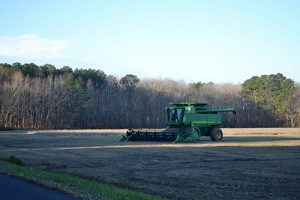
BERLIN – Wet weather, followed by small yields and low prices, made the year a challenging one for local farmers.
Members of the local agriculture community said a variety of issues, the most obvious of which was the seemingly endless rain this area experienced, made 2018 a difficult year for farmers.
“A couple years like this in a row and we’ll be in trouble,” said Alan Hudson, president of the Worcester County Farm Bureau.
Local farmers measured anywhere between 60 and 70 inches of rainfall so far in 2018. Typically, Worcester County gets slightly more than 40 inches of rain in a year.
“We did not even get a hurricane,” Snow Hill farmer Virgil Shockley said. “You had nor’easter after nor’easter. It seemed like it rained every weekend this spring.”
He said the rains in the early part of the year were particularly hard on farmers, most of whom were trying to get their crops in the ground.
“We had a scenario in the spring where people got corn in and it rained 14 inches,” he said. “A lot of the acres got drowned out. They replanted and got seven inches more.”
Fellow Snow Hill farmer Brooks Clayville agreed. He said the timing of the rain was particularly unfortunate.
“Things have got to be timely within the growing season,” he said. “It got to be a challenge.”
Though it’s not a major crop in the area, hay was also heavily impacted by the wet weather over the course of the summer. Hudson said it didn’t get enough curing and drying time.
Clayville agreed. He said someone called him just this week from New York looking for hay.
“I don’t even grow hay,” he said. He believes the entire northeast will be dealing with a lack of hay this winter as a result of the rain.
“You need dry weather to make your hay bales,” he said. “There are already people looking for hay for their livestock.”
Farming hasn’t been any easier in Wicomico County. Daniel Rayne, who farms a couple thousand acres of wheat, corn and soybeans, said rain delayed planting for weeks. Once the seeds were in the ground, however, the precipitation continued.
“The crop got off to a bad start,” he said.
This fall, rain again proved a problem. Soybeans, which are typically all harvested by Thanksgiving, can still be found in many fields throughout the Lower Shore.
“We’re having a hard time harvesting them because it rains every few days,” Rayne said.
Farmers who have gotten all their crops in say that their yields are lower than they hoped. Depending on the farm, Shockley said his soybean crop was 10-30 bushels per acre less than it was last year. His corn crop came in about 30 bushels an acre below what he expected.
Rayne reported similar numbers.
“We’re probably off 30 or 40 bushels an acre,” he said.
Rayne, who’s still bringing in soybeans, said that in addition to hurting the crop as it grew the rain had impacted prices. He explained that the beans being harvested weren’t as dry as they should be and resulted in lower prices from buyers. That’s on top of the fact that overall soybean prices are down about $2 from where they have been in recent years because of the country’s trade war with China. In years past, China was the world’s biggest buyer of soybeans.
“China’s cut off buying so our supply has gone up,” Rayne said. “We need somebody to buy our soybeans.”
Shockley pointed out that bean prices had dropped in spite of the fact that crops in the south had been wiped out by hurricanes.
“It’s almost like somebody has to lose for farmers to make money,” he said. “What would have happened if those guys hadn’t been hit?”
He added that those who grew poultry as well as crops were dealing with even more challenges, as the declining cost of beef lowered the demand for chicken.
“The dairy industry is having a disastrous time,” Shockley said. “They’re losing their farms and so they’re selling their cows so the price of beef goes down … So the poultry industry has to lower its prices to compete. People aren’t buying chicken when they can buy steak.”
Shockley said the best most local farmers could expect this year was to break even.
“I hate to use the cliché ‘perfect storm’ but that’s exactly what happened,” he said.
What that means going forward is that farmers won’t start 2019 with the cushion they’ve had in the past.
“The surplus is not there,” Rayne said. “Most farmers, we won’t have as much money to start with because we’ve had a poor crop this year.”
Shockley said bills for seeds and fertilizer had to be paid if farmers wanted to get crops in the ground.
“The problem is we haven’t had great prices, great yields for the last three years,” he said. “It was enough to get by but you didn’t put away a lot for that rainy day.
Acknowledging the industry’s reliance on the weather, Hudson says all farmers can do is look forward to a new year.
“It’ll be good to see this year done with,” he said.

